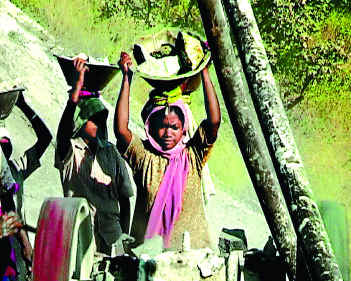
IMAGES FROM `Ab Aur Waqt Nahin'. The film portrays the growing selfconfidence among Adivasis and theirindomitable spirit to fight exploitation at all levels.
UNTIL the 1990s, when the movement for a separate state gathered momentum, Jharkhand was not in the public mind. Carved out of southern Bihar, it came into being in November 2000. However, the region has a distinct geopolitical and cultural identity that goes back centuries. It is essentially a tribal territory with mainly four communities - Mundas, Hojans, Santhals and Oraons - but as many as 30 distinct tribes engage in self-reliant and equitable agricultural occupation. Over time, "outsiders", or dikus as they are called, have exploited the people and their forest resources. The process began during Akbar's reign, heightened during the British rule and continues to this day in Independent India.
The large-scale industrialisation of the region aimed at exploiting its rich mineral resources. The setting up of coal mines and steel plants, and various development projects has led to extensive environmental degradation, widespread industrial pollution and depletion of forest and water resources. Furthermore, it has unleashed corrupt commerce and politics, unbridled exploitation of the tribal communities and haphazard urbanisation. Thousands have been forced to give up their habitat with paltry compensation for displacement. Between 1970 and 2000 as many as 10 lakh Adivasis have been displaced and 40 lakh non-Adivasis have migrated into Jharkhand, thus transforming the demographics of the region. The destruction of the agricultural and ecological niche that sustained these subsistence communities has resulted in deprivation of their lives and livelihood.
With dried-up water resources and ill-implemented irrigation projects, they have only one harvest a year and eagerly await a good monsoon. During the rest of the year, the Adivasis, including women and children, are forced into daily wage labour in mines, quarries and civil works where conditions of work are hazardous and there are grave violations of human rights, sexual and otherwise.

Ab Aur Waqt Nahin (Running Out of Time), a sensitive documentary about the Adivasis by Abhijay Karlekar, is aptly titled. The 109-minute film, produced by SHAPE, Kolkata, suggests that Jharkhand is in its last phase of environmental degradation and the local population that is dependent on agriculture is on the verge of extinction. With the formation of the new State, political manoeuvring and manipulation at the cost of tribal welfare seems only to have deepened.
"Sarkar badalne se kya hota hai? Hamari bhasha to woh samajhte hi nahin hain," (change of government does not mean anything. They do not understand our language) says a tribal person on camera, perhaps summing up their dilemma. "Chhote kisan ko ashakt bana diya hai," (the small farmer has been rendered powerless) comments the narrator in another portion of the film. As the film depicts effectively, today there are two Jharkhands - one of the marginalised Adivasis, and the other, the migrants who call the shots, spreading the neoculture of urbanisation, commerce, industry and trade. "It is a form of internal colonialism," points out an activist working for the tribal people's cause. At the Lal Chowk in Ranchi, the once prosperous locals are today left pleading with the contractors merely to eke out a living. Outside the steel plant in Jamshedpur, Adivasi men wait to be picked up for odd-jobs on a daily wage. These images are symbolic of this ever-deepening division that is dispossessing the indigenous people.
Portrayal of marginalised people without getting caught in the arguments of partisan politics and ideological posturing is not easy. The film could even be criticised for not saying anything about the naxalite movement. It is their deprivation and marginalisation that is drawing the tribal people to extremism.
Full Article
No comments:
Post a Comment